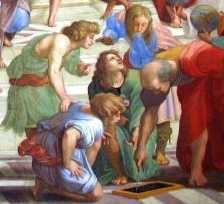"Diurno" is from the instruction in the Liturgia Horarum which reads: Quando Officium lectionis dicitur diurno tempore. "When the Office of Readings is said during the daytime." For the last two weeks, I have been translating the hymns which were designated Quando Officium lectionis dicitur noctu vel summo mane. "When the Office of Readings is said during the night or early morning." Traditionally, Matins, the office which became the Office of Readings, was always said during the night or early morning. The Second Vatican Council changed this in recognition of the fact that clergy in the 20th century (and beyond) were not required to live the same schedule as monks, who often went to bed at 7pm and rose at 3am. The Council Fathers also wanted to encourage lay people to pray the Liturgy of the Hours as well.
Regular readers of this blog will remember that most of the hymns I have been translating the last two weeks have had a noctural theme or at least written with the idea that the singers of the hymn would be singing in the middle of the night Apparently the Council Fathers envisioned that the Office formerly known as Matins would be able to be said at any other hour of the day, hence another set of hymns is needed. Fr. Anselmo Lentini, the editor of the Liber Hymnarius put together fourteen more hymns (two weeks' worth) in addition to the fourteen I've just translated. I am anxious to look at the character of these hymns.
Here is the first:
Memorial of the Resurrection
Dies ætásque céteris
Over days and other ages
octáva splendet sánctior
the eighth shines out more sacred
in te quam, Iesu, cónsecras,
which, Jesus, Thou consecratest for Thyself,
primítiæ surgéntium.
the first fruits of those who rise(from the dead).
Tu tibi nostras ánimas
Thou to Thee our souls
nunc primo conresúscita;
now first raise together from the dead;
tibi consúrgant córpora
may our bodies rise up also to Thee
secúnda morte líbera.
free from the second death.
Tibíque mox in núbibus,
To Thee also soon in the clouds,
Christe, ferámur óbviam
O Christ, let us be borne on the way
tecum victúri pérpetim:
to be conquering with Thee continually:
tu vita, resurréctio.
Thou our life, our resurrection.
Cuius vidéntes fáciem,
Thou whose face we will be seeing,
configurémur glóriæ;
may we be shaped into that glory;
te cognoscámus sicut es,
may we come to know Thee as Thou art,
lux vera et suávitas.
true Light and Sweetness.
Regnum, cum Patri tráditos,
Thy kingdom, when you deliver us to the Father,
plenos septéno chrísmate,
filled with the seven-fold annointing,
in temet nos lætíficas,
fill us with the joy that is Thee Thyself,
consúmmet Sancta Trínitas. Amen.
may the Holy Trinity bring it (Thy kingdom) to perfection.
This hymn is by a certain Aron of the twelfth century, not well identified. The hymn "concludes a cycle, in which every day one of the gifts of the Holy Spirit is celebrated." I wonder whether we will get to see any of the other hymns in the cycle.
It seems to me excellently suited to Sunday, with its resurrection theme. If you look at the noctu hymn for today (found here), you will see that it starts out calling Sunday the "first of all days," whereas this hymn refers to Sunday as the "eighth day." Fr. Z at wdtprs speaks eloquently both in blog entries and in podcasts about octaves being days when time itself is suspended to celebrate a major feast like the Resurrection, the birth of Christ and (until the Council) the Descent of the Holy Spirit at Pentecost. Seen in this light, there is no confusion: Sunday is both the first day and the eighth day.
“Let us run with this thought experiment for a moment.”
-
Peter Kwasniewski invites a mind experiment. Let us run with this thought
experiment for a moment. Imagine the Divine Liturgy of Saint John
Chrysostom as o...
20 hours ago

3 comments:
"Dies" and "aetas" are nominative, so they form the subject of the sentence and are both modified by the adjective "octava". "The eighth day, and the eighth age, shine more sacred than the rest". The eighth age is a reference Saint Augustine's mapping of the seven ages of the world to the seven days of the week.
Also, I think you meant "consecratest", rather than "consecrates". Likewise, I think you meant "thou" rather than "you" in the last verse.
Wow, I didn't know that about St. Augustine. That's really cool. I wonder which "day" = age we are in now.
I often waver on "Thee" and "Thou" because the need to add "est" on all their verbs sometimes is a bit much for me. But you're right, I should either do it or not.
I can only speculate about which age we are currently in, but based on Wikipedia's article "Six ages of the world" (which, sadly, I am more familiar with than Augustine's own writings), I would guess we are in the 6th age, the Friday age. The death of the world will be the Saturday age, or 7th age. The new heavens and the new earth shall be the first age (day) of the next world (week), or the 8th age (day).
But I must confess that little of this is very clear to me.
Post a Comment